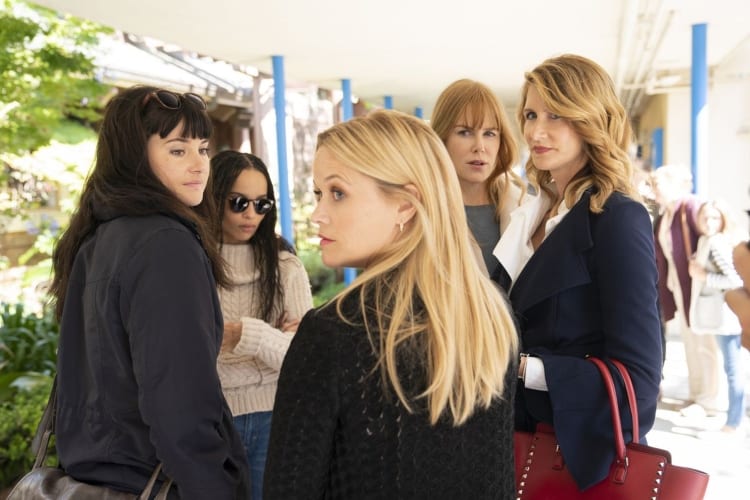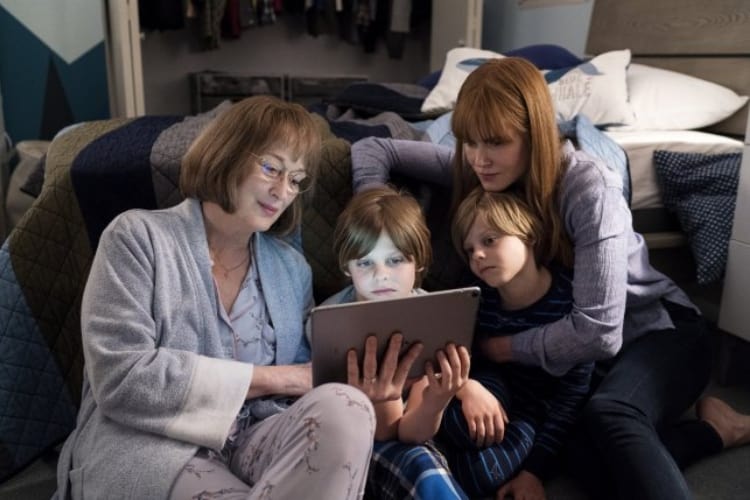
There are two types of secrets. There’s the kind that stays inside you for so long, tucked neatly away in some cabinet of the mind, that it feels small. If this type of secret were a voice, it’d speak in little more than a whisper. Then there’s the sort of secret that hollows you out and fills you up with the truth of it until it’s as if it’s all you are. This sort of secret rattles and roils inside of you, threatening to burst forth each time you open your mouth.
As its title would suggest, Big Little Lies has plenty of both kinds of secrets. Heading into season two, the Monterey Five–Madeline Mackenzie (Reese Witherspoon), Jane Chapman (Shailene Woodley), Celeste Wright (Nicole Kidman), Bonnie Carlson (Zoë Kravitz), and Renata Klein (Laura Dern)–are living with the knowledge that they participated in and covered up a murder. Originally planned as a single-season adaptation of Liane Moriarty’s bestselling book, the limited series was expanded to a second season after a successful first batch of episodes.
Everything we see in the second season goes beyond the book, and rather than being limited by this responsibility to continue the narrative (like, say, Game of Thrones), Big Little Lies so far appears to have been freed to widen its scope. Filmmaker Andrea Arnold (Fish Tank, American Honey) directs all seven season two episodes, replacing season one director Jean-Marc Vallée (Sharp Objects), who still produces. Meanwhile, Meryl Streep joins the cast as Perry’s (Alexander Skarsgård) thoroughly eccentric mother, Mary Louise. Scarcity of story and plot are likely fans’ biggest concerns heading into the sophomore season, but by the second episode, it’s clear that these fears are unfounded; our Monterey moms still have a lot going on.
https://www.youtube.com/watch?v=eCWevZV945M
Secrets are the catalyst for every action and reaction this season. At this point, there are so many, big and small, involving infidelity and abuse and parentage and murder, that they’re all destined to dramatically resurface in the way that night-time soap operas and prestige crime dramas are wont to do. The season’s second episode, “Tell-Tale Hearts,” examines the ways secrets pull marriages and families apart, but it also relishes in the catharsis of uneasy honesty. While Celeste attempts to convince Mary Louise of Perry’s abuse, Madeline does her version of begging Ed (Adam Scott) to stay after he discovers her affair. Secrets that maintained the first season’s plot are instantly and easily unraveled in season two as if it’s writer David E. Kelley’s way of saying the series can stand on its own two feet even without source material.
No scene in the first two episodes is as powerful as Jane’s bedtime admission of Ziggy’s (Iain Armitage) parentage. Jane’s deepest-buried secret–the rape that resulted in her young son’s conception–spilled over last season, and now news of it has traveled to people she doesn’t even know, including at least one who doesn’t believe her. But when Ziggy tells her he heard about “Mr. Wright giving you salt,” his interpretation of the word assault, it’s impossible not to cry along with Jane. Woodley plays the scene with a heartfelt mix of stone-faced resilience and unstoppable emotion, tears leaking down her face even as she steels herself to tell him the truth without even considering the alternative. While the other main moms continue to sugar-coat or lie to save face–Bonnie tells her daughter she isn’t mad at anyone, Madeline tells Ed he misheard the news about her affair, and Celeste tells her sons that Perry was a “beautiful man”–Jane’s truth comes out like a cork from a bottle, dispersing years worth of built-up pressure in one quick moment.
In “Tell-Tale Hearts,” family is the name of the game, and every character comes prepared with platitudes about the topic that aren’t quite enough to get them through the aftermath of a murder. “A family is meant to be open and honest with each other,” Celeste tells her twins, to which one replies, “I don’t think we’re that type of family.” Later, she says, “Family isn’t always everything, but sometimes it is.” Ed calls Madeline out for a “violation of family” when she keeps Ziggy’s parentage from him, while her older daughter Abigail (Kathryn Newson, the reigning queen of angry teen roles) points out that Madeline used to think family was the most important thing. Bonnie’s mother (Crystal Fox) needles at her during a family dinner, and when her daughter leaves the table, she’s unrepentant, saying, “Getting in each other’s business, that’s what families do.”

None of these quotables can do much to comfort women whose worst secret–Perry’s murder–both isolates and makes hypocrites of them no matter how honest they are about everything else. Despite the Monterey Five’s isolation, it’s significant that family members continue to reach out and try to help in their own slightly broken ways. The best part of the series’ first season was the ending, the complicated shockwave that went through the group when they all suddenly knew the truth about Perry. That almost supernatural form of connection might be missing at the moment, but the people who love our protagonists are fighting to find it.
Liane Moriarty’s book was a gossipy, entertaining read, but HBO’s Big Little Lies has already evolved into something deeper and greater than its source material. There are certainly more secrets to be revealed. What happened to Perry’s brother, for example? But Big Little Lies sets itself apart from other shows built around lies, like Desperate Housewives or Pretty Little Liars by choosing to dig deep and boldly into the fears and desires of women. Characterization trumps plot twists every time, and the series is better for it. Above all else, the show explores the pain that families inflict on one another: the trauma of parenting, of being a child, of working through or ending a marriage, and the ways in which people choose to connect despite it all. Even with large demographic differences likely separating most viewers from these women, the series’ core concern–that you’ll fuck up your kids or families beyond repair, or fuck yourself up in the process of trying to care for them–is a universal one. The characters may have their secrets, but Big Little Lies is still one of the most emotionally honest shows on TV.
Related Topics: andrea arnold, Big Little Lies, Laura Dern, Meryl Streep, Nicole Kidman, Reese Witherspoon, Shailene Woodley, Zoe Kravitz

